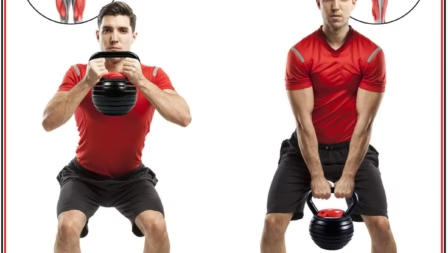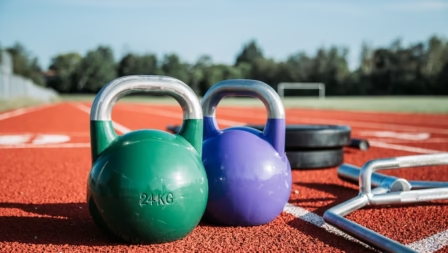What Is The Best Diet To Build Muscle?
Building muscle is important for maintaining a healthy and active lifestyle. But, with all the different diets out there, it can be difficult to decide which one is best for you.
In this article, we’ll discuss what the best diet is for building muscle and how to follow it. We’ll explain the basics of following a muscle-building diet, including what types of foods to eat, how much to eat each day, and how often to eat.
We’ll also provide tips on meal planning and supplementing your diet with vitamins and minerals for optimal results. By the end of this article, you’ll have a better understanding of what makes up an effective muscle-building diet and how to put it into practice in your own life.
Macronutrients And Their Role In Muscle Building
Building muscle takes more than just regular exercise. Your diet is an important factor in the muscle building process.
Macronutrients are a key component of your diet and play a major role in how quickly and efficiently you can build muscle.
Protein, carbohydrates, and fats are the three main macronutrients that should be included in your diet to help build muscle.
Protein provides essential amino acids that help create new proteins for muscle growth, while carbohydrates give you energy to fuel workouts. Fats are essential to absorbing certain vitamins and minerals, as well as providing energy during rest periods.
It’s important to find a balance between all three macronutrients when designing your dietary plan for optimal muscle building results. Eating the right combination of these macronutrients will ensure that you have enough energy to fuel workouts while also supplying your body with the nutrients it needs to grow stronger muscles.
The Best Sources Of Protein
Building muscle is a challenge that takes dedication and hard work, but having the right nutrition plan is essential for you to reach your goals. Eating the right sources of protein is one of the most important components of a successful diet for building muscle. Protein helps build and repair muscle tissue, making it an essential nutrient when trying to increase your muscle mass.
Here’s a look at some of the best sources of protein to help you reach your muscle-building goals.
One great source of protein is lean meats like chicken, turkey, and fish. Lean meats are high in protein while low in fat and calories, making them ideal for building muscle without adding unwanted animal fats.
Eggs are also an excellent source of protein; they contain all nine essential amino acids required for optimal health.
For those looking for plant-based proteins, beans, nuts, seeds, and quinoa are excellent options that provide plenty of nutritional benefits.
Additionally, dairy products like milk and yogurt are great sources of high-quality proteins that can help you reach your goals.
Whichever type of protein you choose to incorporate into your diet, make sure it fits with your lifestyle and health goals as well as providing enough variety to keep meals interesting.
With a balanced diet full of nutrient-rich proteins along with fruits, vegetables, whole grains, dairy products and healthy fats – reaching your fitness goals will be easier than ever!

Healthy Fats For Muscle Building
Having a balanced diet is essential for muscle building. Healthy fats are an important part of this equation as they provide energy, help with the absorption of fat-soluble vitamins, and even aid in testosterone production – a hormone involved in muscle growth.
Incorporating healthy fats into your diet can be done through various sources such as avocados, nuts and seeds, olive oil, fatty fish like salmon and trout, grass-fed beef or butter, and coconut oil.
In addition to providing these health benefits, having healthy fats in your diet can help make meals more satisfying and enjoyable. For example, adding avocado slices to a salad or adding nuts to oatmeal or yogurt can add texture and flavor that will make the meal taste better while also providing nutrition.
Additionally, healthy fats are also great for cooking as they don’t break down easily at high temperatures like some other oils do. Ultimately, incorporating healthy fats into your diet is key to building muscle and should not be overlooked!
Carbohydrates For Muscle Recovery
Building muscle requires a carefully balanced diet, which includes healthy fats and carbohydrates. Healthy fats provide the energy needed to sustain workouts and help build muscle.
Carbohydrates are necessary for muscle recovery after strenuous exercise. Carbohydrates should be consumed in moderation when building muscle. Whole grain carbs such as oats, quinoa, brown rice, and whole wheat bread are good sources of complex carbohydrates that will help fuel your workouts without adding empty calories.
They also provide long-term energy to keep you going throughout the day while helping your body recover from intense training sessions. Low-glycemic index carbohydrates such as sweet potatoes, yams, beans and legumes can also provide sustained energy levels to support an active lifestyle.
Eating these foods in combination with lean proteins and healthy fats will ensure that you have the fuel you need to maximize your training sessions and reach your goals.
Vitamins And Minerals For Optimal Results
If you’re looking to build muscle, the right diet is essential for getting the most out of your efforts. Vitamins and minerals can play an important role in helping you achieve optimal results.
A balanced diet with plenty of proteins and complex carbohydrates will provide the nutrients necessary for muscle growth, but adding a few key vitamins and minerals can give you an even bigger boost. Consuming adequate amounts of zinc, magnesium, calcium and vitamin D can help ensure that your body gets everything it needs to make gains.
Additionally, a daily multivitamin supplement may be helpful in filling any gaps in your nutrition plan.

Frequently Asked Questions
How Much Protein Should I Consume Daily To Build Muscle?
In order to build muscle, you need to ensure that you are getting enough protein in your daily diet.
How much of this macronutrient you should consume will depend on your body type and goals, but generally speaking, a good guideline is to aim for around 1g of protein per pound of body weight.
This means that if you weigh 150lbs, you should aim for around 150g of protein every day.
What Is The Best Type Of Exercise To Build Muscle?
When it comes to building muscle, the best type of exercise is a combination of resistance training and aerobic exercise.
Resistance training helps build muscle by increasing your strength and endurance, while aerobic exercise helps improve cardiovascular fitness and increase your oxygen intake.
Both types of exercise should be done regularly for optimal results.
Additionally, proper nutrition is essential for muscle development, so make sure you are getting enough protein and other nutrients in your diet to fuel your workouts.
How Quickly Can I Expect To See Results?
How quickly can you expect to see results from your muscle-building efforts?
Unfortunately, there’s no simple answer. It’s important to remember that everyone is different and results will vary from person to person.
That said, many people can start to notice changes in as little as two weeks with a consistent exercise program and healthy diet.
For more significant changes, you may have to wait up to 8 weeks or longer, depending on the intensity of your workout and the quality of nutrition you’re getting.
Should I Take Supplements To Build Muscle?
Supplements can be a helpful addition to your muscle building diet, but they aren’t necessary for everyone. It all depends on your individual fitness needs and goals.
Protein powders, pre-workout drinks, and other performance enhancers may be beneficial if you’re looking to increase your strength or endurance, but check with a doctor or nutritionist first to make sure the supplements are safe for you.
How Much Fat Should I Consume For Muscle Building?
It’s important to consume enough fat when building muscle. Your body needs the essential fatty acids found in fats for optimal performance, growth, and recovery.
The amount of fat you should consume depends on your individual goals, but generally it’s recommended to get between 20-25% of your total calorie intake from healthy sources of fat like nuts, avocados, olive oil, and fatty fish.
Eating enough fat is essential for muscle growth, so make sure to include it in your diet when trying to build muscle.
Conclusion
To conclude, it’s important to remember that having a balanced diet and the right exercise routine are the most important factors in building muscle.
You should aim to consume at least 1g of protein for every pound of body weight each day.
Additionally, doing compound exercises such as squats, deadlifts, and bench presses will help build muscle faster.
Supplements can be taken if you’re struggling to get enough nutrients from food alone.
Lastly, don’t forget to include healthy fats in your diet as they provide essential vitamins and minerals needed for muscle growth.
If you stick to these guidelines and practice consistency with your workouts and nutrition, you’ll start seeing results in no time.
It may seem like an uphill battle at first but with patience and dedication you’ll be on your way to achieving the body of your dreams!
Ultimately, when it comes to building muscle there is no one-size-fits-all approach – what works for one person may not work for another.
So experiment with different diets and exercises until you find what works best for you.
With the right combination of nutrition and exercise, anyone can achieve their goals of building lean muscle mass!


